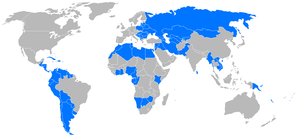Emerging-market stocks will gain 9 percent in 2010

Emerging-market stocks will gain 9 percent in 2010, compared with a 5.5 percent return for U.S. equities, according to a global investor survey from Bank of America Corp.
Developing-nation investors are “overweight” stocks in higher-yielding countries including Russia, Brazil and Turkey and “underweight” equities in nations such as Malaysia and Chile, Bank of America global equity strategist Michael Hartnett wrote in an e-mailed report, citing a survey of fund managers. A quarter of emerging-market investors say the asset class is “undervalued,” according to the survey.
The MSCI Emerging Markets Index of 22 developing countries has rallied 72 percent this year, poised for its best annual gain, on speculation China will lead the global economy out of recession.
“Global investors remain optimistic on emerging markets going into the New Year,” Hartnett wrote.
The MSCI index fell 0.2 percent to 973.42 as of 5 p.m. in New York. The extra yield investors demand to own developing nations’ bonds instead of U.S. Treasuries narrowed one basis points to 2.93 percentage points, according to JPMorgan Chase & Co.’s EMBI+ Index. A basis point equals 0.01 percentage point.
Housing starts in the U.S. rose in November and a gauge of consumer prices was unchanged, supporting forecasts for a recovery in the world’s biggest economy.
Micex Jumps
Russia’s benchmark Micex surged 4.2 percent today as rising oil prices boosted the earnings outlook of the country’s energy producers. OAO Gazprom, Russia’s gas-export monopoly, increased 5.3 percent and OAO Rosneft, the country’s biggest oil company, rose 6.6 percent after the Economy Ministry raised its forecast for gas output and exports over the next three years.
Crude oil rose 2.8 percent, the most in a month, to $72.66 a barrel.
Brazil’s Bovespa index fell the most in a week as a faster- than-estimated expansion in payrolls spurred traders to raise bets on interest rate increases before the release of central bank minutes tomorrow. Lojas Americanas SA, Brazil’s largest discount retailer, sank 5 percent.
Dubai shares advanced to the highest in more than two weeks, led by Emaar Properties PJSC and Arabtec Holding Co., on investor speculation that declines so far this quarter are overdone given growth prospects.
China Construction Bank Corp., the nation’s second-largest bank, slid 2.1 percent in Hong Kong after a regulatory official said bad loans pose a long-term risk. Vietnam’s benchmark index slumped 3.8 percent as the central bank damped speculation it was injecting capital into banks.
‘Trickier Year’
Next year “will be a trickier year than 2009,” Wendy Liu, head of China research at Royal Bank of Scotland Group Plc, said in a Bloomberg Television interview from Hong Kong. “In 2010, what we’re looking at is the real economy charging ahead but the asset plays may have to calm down a bit, partly because of the focus on reining in asset bubbles.”
China’s banks will face risks from bad loans and from too many loans being concentrated in certain industries and in big customers for a “long period of time,” said Wang Huaqing, disciplinary commissioner of the China Banking Regulatory Commission.
Chinese stocks are headed for a “boom and bust” in 2010 because a rally in the first half may stall as inflation accelerates and the government withdraws some stimulus, Morgan Stanley said.
Dec. 16 (Bloomberg) --